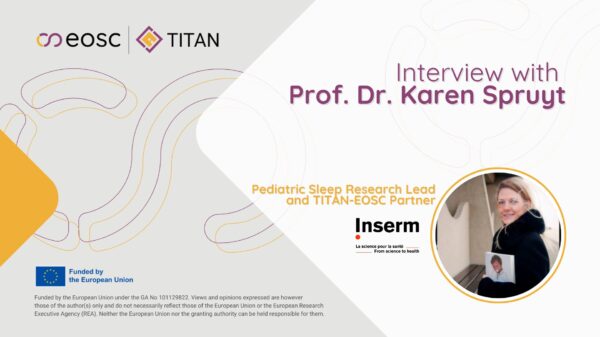Funded by the European Commission, TITAN (Trusted envIronments for confidenTiAl computiNg and secure data sharing) it’s a 36-month project that will deliver an open-source software platform focused on enabling secure sensitive data sharing, and demonstrate them in the EOSC ecosystem.
Inserm, a crucial partner in the TITAN project, is France’s sole public research organization dedicated to human health. We recently spoke with Prof. Dr. Karen Spruyt, Pediatric Sleep Research Lead at Inserm and a TITAN-EOSC Partner. She shared her expert perspective on the unique challenges of health data sharing, particularly in pediatrics, and how TITAN-EOSC will enhance secure and ethical data utilisation for groundbreaking research.

What motivated your organisation to become a partner in the TITAN-EOSC project?
Inserm is the only public research organisation in France entirely dedicated to human health. Our mission is to advance knowledge of life and disease mechanisms and to foster innovation in service of improving population health. Joining the TITAN-EOSC project aligns perfectly with this mission. It offers a unique opportunity to contribute to the development of open science infrastructures and data-sharing frameworks that accelerate health research, enhance collaboration, and ultimately benefit patients and society. Being part of TITAN-EOSC allows Inserm to actively support the implementation of FAIR principles and to promote responsible, transparent, and impactful research at the European level.
Can you briefly describe your organization’s main role and key responsibilities within the TITAN-EOSC project?
INSERM plays a pivotal role in the TITAN-EOSC project in two key areas. First, as health research in France is subject to stringent ethical and regulatory frameworks, our involvement highlights where bottlenecks can emerge in the health data-sharing process—from patient-level data to analytical outputs. My own internationally oriented research further enriches this perspective, offering insight into how ethical standards vary across health research systems globally.
Second, our expertise in pediatric sleep research adds scientific depth to the project. Sleep data is inherently multimodal, involving diverse data formats—ideal for testing the interoperability and integration goals of TITAN-EOSC. Moreover, pediatric data presents unique challenges, as it evolves with age and may later intersect with adult datasets across Europe. This longitudinal dimension adds complexity to data governance and emphasises the importance of robust, scalable sharing frameworks.
Considering INSERM’s expertise in biomedical research and its commitment to enhancing healthcare, what specific opportunities do you see for the TITAN-EOSC platform to advance research in this domain through secure data sharing and confidential computing?
The TITAN-EOSC platform presents a vital opportunity to strengthen the foundations of European healthcare and biomedical research by enabling secure, ethical, and interoperable data sharing. As a public health institution, INSERM recognises that innovation in science stems from collaboration—across disciplines, borders, and sectors. To facilitate this, we need not only robust data governance but also secure, confidential computing environments that respect patient privacy while unlocking the full potential of health data.
By supporting FAIR (Findable, Accessible, Interoperable, Reusable) data principles, TITAN-EOSC can accelerate transnational research and foster a culture where scientific knowledge is openly shared and ethically managed. Science is not an individual pursuit—it is a collective endeavour. The value of research lies in its capacity to be built upon, extended, and applied for the benefit of all. TITAN-EOSC helps turn this vision into reality by providing the tools to share data responsibly, paving the way for breakthroughs in public health and personalised medicine.
Given INSERM’s engagement in a wide spectrum of research from laboratory to patient care, what are some of the key data privacy and security considerations that are paramount for INSERM when participating in a project like TITAN-EOSC, especially concerning sensitive health-related data?
At INSERM, the protection of sensitive health data is not only a legal obligation but also a fundamental ethical commitment. Participating in a project like TITAN-EOSC requires the highest standards of data privacy, confidentiality, and governance, across the entire research continuum, from the laboratory bench to patient care. Key considerations include ensuring compliance with national and European regulations (such as the GDPR), securing informed consent, maintaining transparency with participants, and implementing technical safeguards such as anonymisation, pseudonymisation, and secure computing environments.
At the heart of these concerns lies a critical and often complex question: who owns the data? This question touches on issues of trust, accountability, and long-term stewardship. For INSERM, data ownership must always be viewed through the lens of patient rights and public interest. Projects like TITAN-EOSC offer a unique opportunity to establish frameworks where data are not only protected but also responsibly shared—balancing individual privacy with collective benefit.
What is your vision for the long-term impact of the TITAN-EOSC platform on the broader research community and the EOSC ecosystem?
The journey from data collection to tangible improvements in patient care, often through scientific publication, is typically long and complex. TITAN-EOSC has the potential to significantly accelerate this process by enabling secure and ethical data sharing across disciplines and borders. By facilitating access to high-quality, well-documented datasets, the platform can support hypothesis testing, replication of findings, and secondary analyses that might otherwise not be feasible. Both positive and negative results play a crucial role in scientific progress, and TITAN-EOSC can help ensure they are more visible and reusable.
In the long term, such infrastructure can foster a culture of openness, collaboration, and transparency in biomedical and health research. It can strengthen reproducibility, reduce redundancy, and promote more efficient use of existing data—ultimately enhancing the impact of research on public health and contributing meaningfully to the European Open Science Cloud (EOSC) ecosystem.
If you had to describe the project in a few words, what would it be?
Transformative!
“If science is the vehicle that carries a health problem toward its solution, then TITAN-EOSC is a pivotal step forward, enabling secure, ethical, and collaborative health research across Europe. By bridging the gap between data protection and data utility, it empowers researchers to innovate responsibly and accelerate better patient outcomes.”
👉 Follow TITAN today and be up to date with all the project’s developments.
👉 Join TITAN’s community on X (@titan_eosc) & on LinkedIn (@titan-eosc)